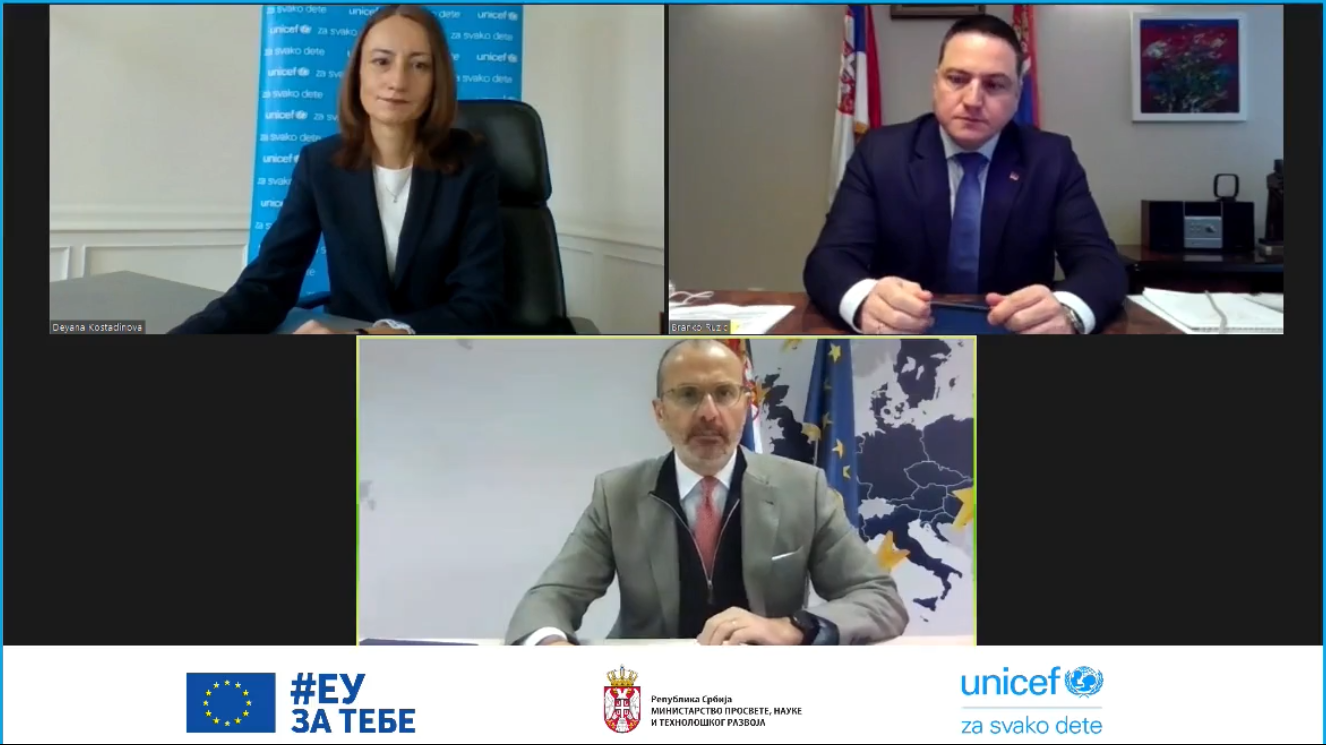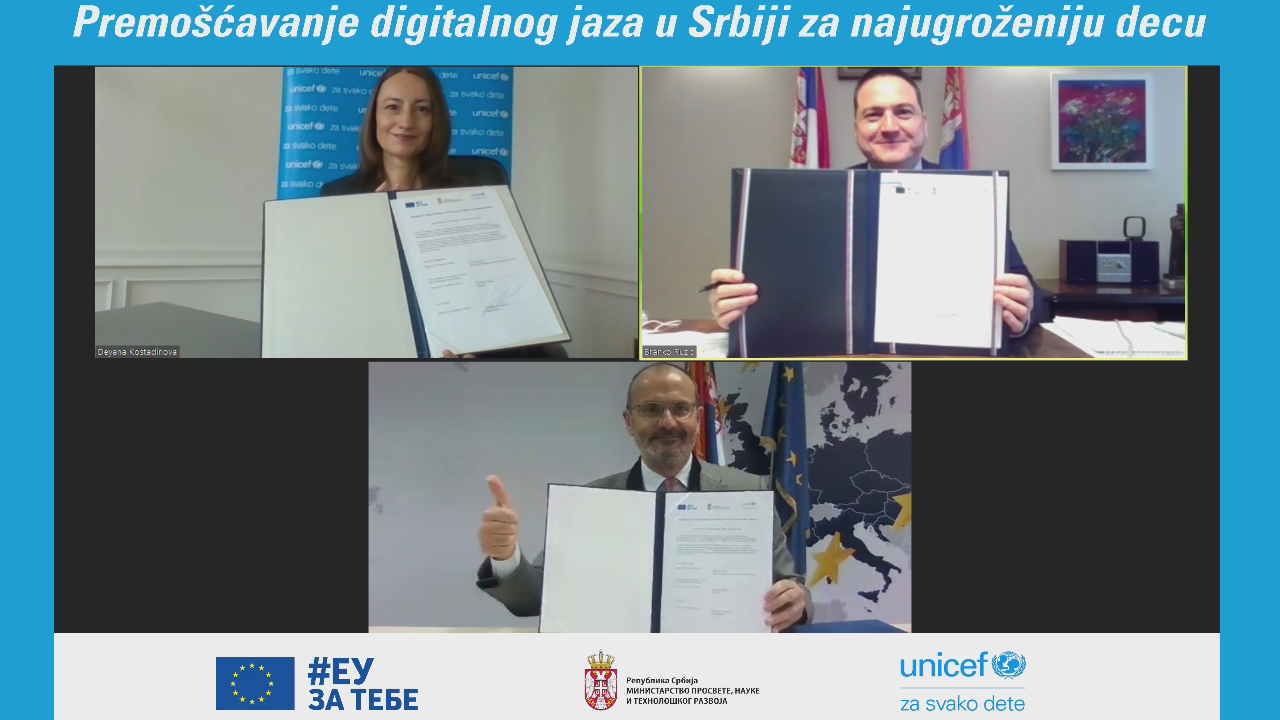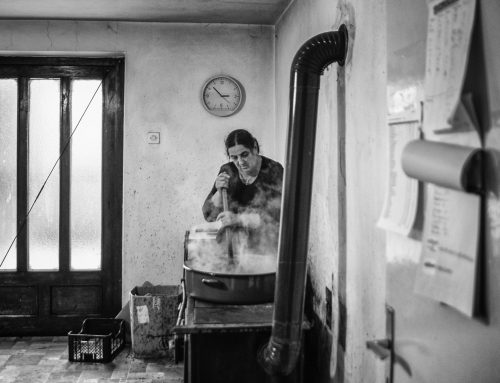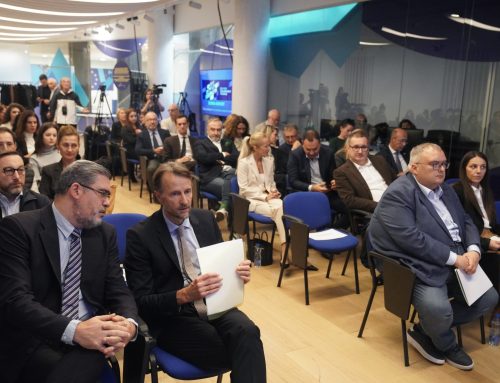First Vice President and Minister of Education, Science and Technological Development, Branko Ruzic, Head of the European Union Delegation to Serbia, Ambassador Sem Fabrizi, and UNICEF Representative in Serbia, Deyana Kostadinova, announced today the beginning of the “Bridging Digital Divide for Most Vulnerable Children” project.
COVID-19 has caused a major disruption of education, affecting an entire generation of students. To make sure no child is left behind in the situation in which instruction moves to distance and online learning, increased efforts are needed to ensure all children have access to digital learning tools, platforms and equipment and do not lag behind their peers. Within this crisis is also an opportunity to accelerate innovations and digitalisation in the education sector.
The Ministry, the European Union and UNICEF have joined forces to bridge the digital divide for some of the most vulnerable children in Serbia through education system support, provision of open source educational resources and technical equipment, as well as through school-based activities aimed at improving learning outcomes of children. The EU funded project is worth €2 million grant and will be implemented in 30 local governments across Serbia.

“One of the priority goals of the Government of Serbia and the Ministry of Education, Science and Technological Development is equal rights and access to education and upbringing without discrimination and separation on any grounds. An inclusive approach has led to the inclusion of more children from vulnerable groups in the education system in Serbia. During the state of emergency, distant learning was established as a model to help maintain and preserve the educational process during the Covid 19 pandemic and special attention was paid to working with students from vulnerable social groups. Support was provided through individualisation measures and the purchase of 1650 devices and 2400 internet cards. Thanks to this support 96% of students from vulnerable social groups were enrolled in classes. This was shown by the data of the research that the Ministry conducted with UNICEF and the Institute of Psychology.
Based on the results of the mentioned research, we mapped the needs, and the Ministry and UNICEF will, with the financial help of the European Commission, start the realisation of the project “Bridging the digital divide in Serbia for children from vulnerable groups”, said Minister Ružić,
Education and the transformation to digital learning are at the heart of building a resilient future. Creating equal and inclusive access to digital education equips young people with digital skills to prepare them for a competitive labour market. European Union is Serbia’s largest donor in education sector with over EUR 100 million invested since 2003.
“The EU stands ready to continue helping Serbia to address the most urgent needs caused by COVID-19. Education is for us a priority. We need adapting the education system to the needs emerging from distance and online learning and avoiding no one is left behind. The most pressing need is to ensure equal access to education particularly for the underprivileged students who are affected the most in this emergency situation. This project is an essential element in the response to bridge the digital divide. By supplying 30 schools in Serbia with 1800 tablets, as well as with other educational resources and support, this project will help the education system to adapt to the new challenges posed by COVID and build the necessary digital resilience also for the future. Every child matters and must be supported. Education is a fundamental right that all children should benefit of”, concluded Ambassador Fabrizi.
Disadvantaged children are most likely not to have access to digital devices, thus their education may regress due to missed lessons or infrequent lessons. Fostering equitable access to digital learning and technology is key to closing the widening gap between school children.
“Bridging the Digital Divide in Serbia for the Most Vulnerable Children project will help putting that strategy into action. In the framework of the initiative, UNICEF will support the establishment of ‘Education Digital Libraries’ and ‘learning clubs’ with 1,800 tablets in 30 selected ‘at risk’ schools; 900 teachers working in these schools will have the opportunity to strengthen their capacities. As a result, minimum 12,000 children will be benefiting in total. Another focus will be on the learning of Roma children with the provision of psycho-social support services”, said Deyana Kostadinova.
Thanks to this project further development of an inclusive e-learning system and strengthening capacity of institutions for its delivery, management and monitoring will be achieved on the national level. This includes further development of technical capacities of the distance learning platform and supporting the development of its content. Furthermore, the intervention will support full development of legal framework that will regulate inclusive distance learning system and establishment of a monitoring and quality assurance process related to quality, relevance and inclusiveness of distance learning system at the national and school level.
In order to prevent digital divide and support the quality of learning for the disadvantaged pupils in those schools equipped with digital devices, the intervention will focus on increasing competencies of teaching staff and pedagogical assistants (PA) to support the participation of children from vulnerable groups in distance learning and overall increase quality of education for all students.
The intervention also aims to raise capacities of both teachers and pedagogical assistants so that the most vulnerable children in the context of COVID-19 pandemic can be provided with additional support.
More information




